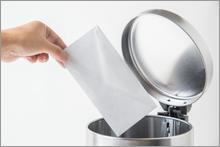
Dean Rieck, a nationally respected direct-marketing consultant, writing in DM News, pinpointed five common ways mail advertisers shoot themselves in the foot:
Hiring a “brand image” agency to do direct mail
Rieck, in the unmistakable tones of a man whose ox has been gored once too often, relates that a major chemical company once asked him to review one of its self-mailers.
“I could tell at a glance that a mass-market agency had created it,” Rieck says. “The copy was cutesy, full of pun-heavy, meaningless headlines. The design was garish, with wild colors and hard-to-read type styles. The offer was hidden. The response elements were buried. The central message was disjointed and unclear. ”In his opinion, most “brand” advertising agencies simply can’t do effective direct-response advertising. So, he recommends, keep a safe distance between your direct mail and any agency without a direct-marketing track record: “Say, 500 miles or so.”
Printing a “clever” teaser on your envelope
The decision whether to use a teaser depends on what you’re selling and your relationship with your prospects,” Rieck maintains. “And it depends on whether you want your ad to look like an ad. Sometimes it should. Often it shouldn’t.”
Spending two weeks on your folder and two hours on your letter
“The letter sells. The brochure tells,”Rieck says. “A package can work without a brochure, but it seldom will work without a good letter.”
Buying first-class postage, but third-class creative“
Do you want the cheapest brain surgeon?” Rieck asks. “Do you shop for economy parachutes? Do you pinch pennies on rattlesnake venom antidote? You get what you pay for,” he says.
Guessing, not testing
A frighteningly large percentage of businesses don’t test. Or don’t test properly,” Rieck insists. And direct-response advertising is largely a counter-intuitive matter. “Until you run a properly designed test, you don’t know jack,” he says. “And even then, you should test again to make sure.” The moral to Rieck’s story is: Better to avoid mistakes than to seek brilliance.